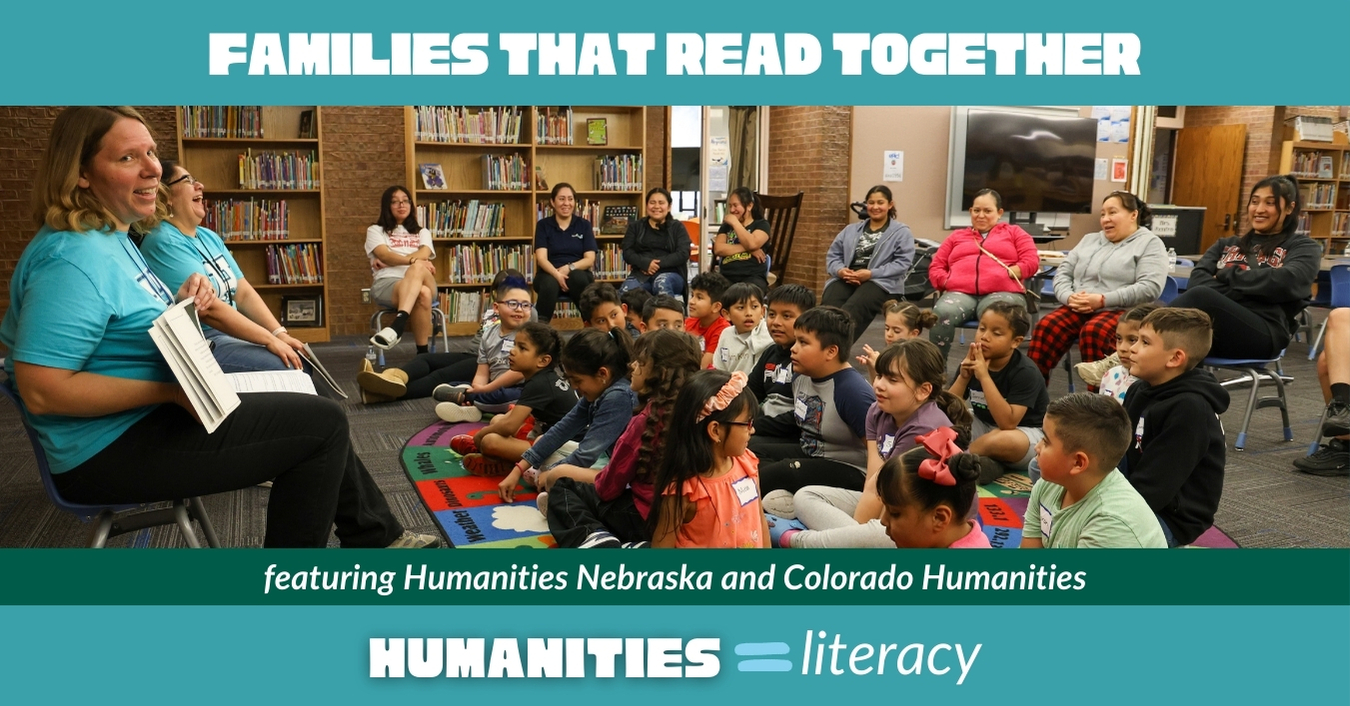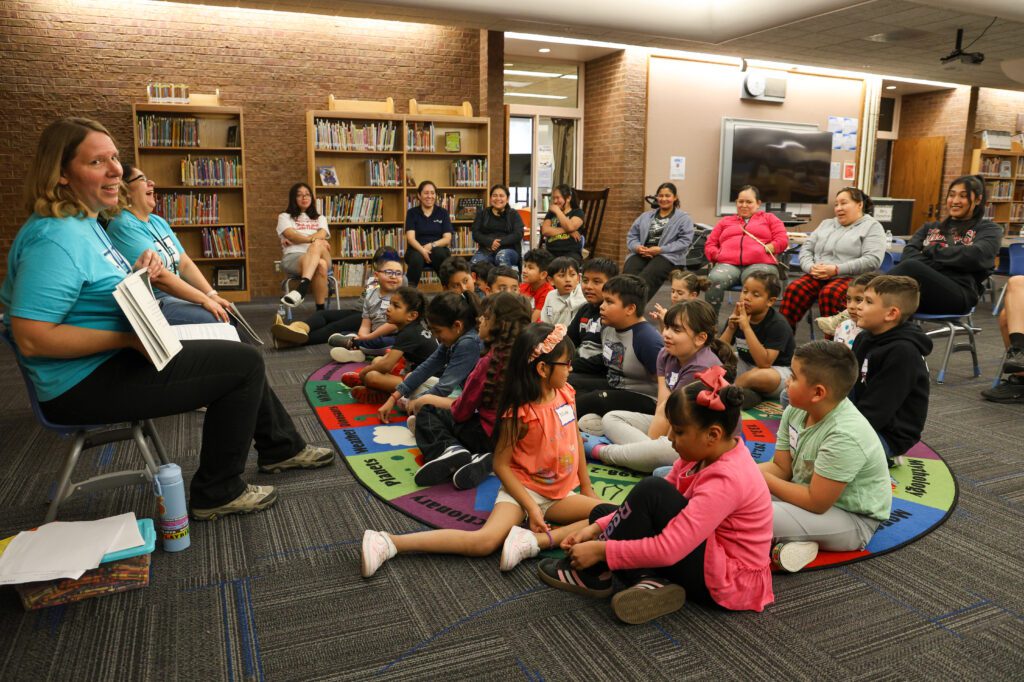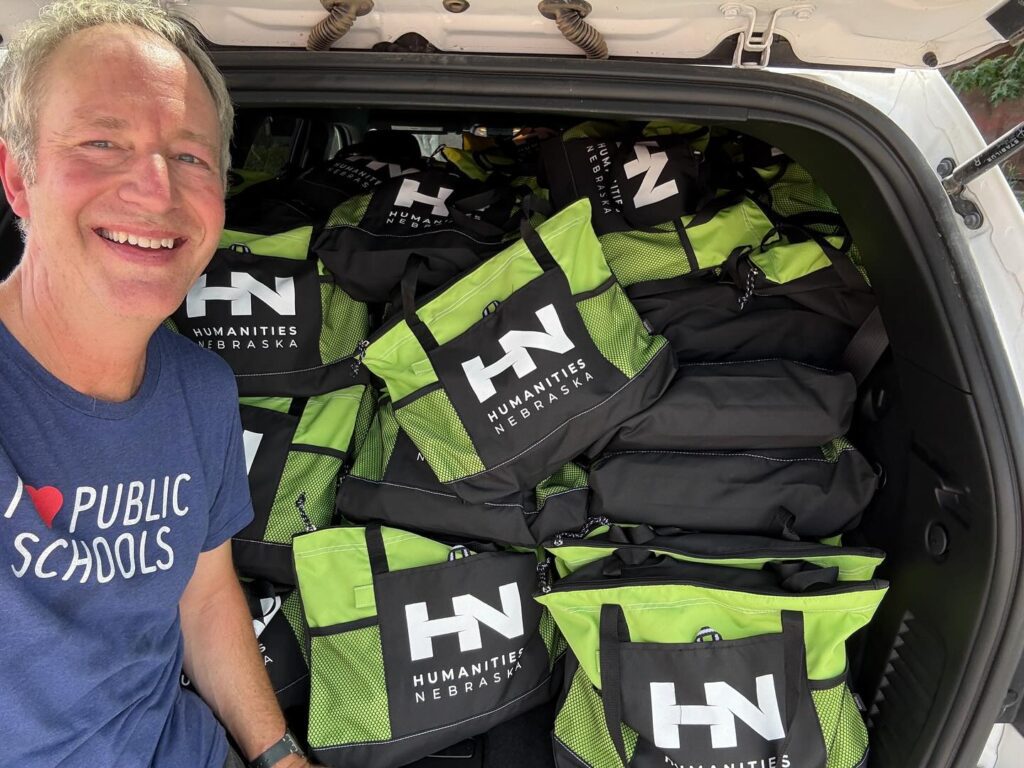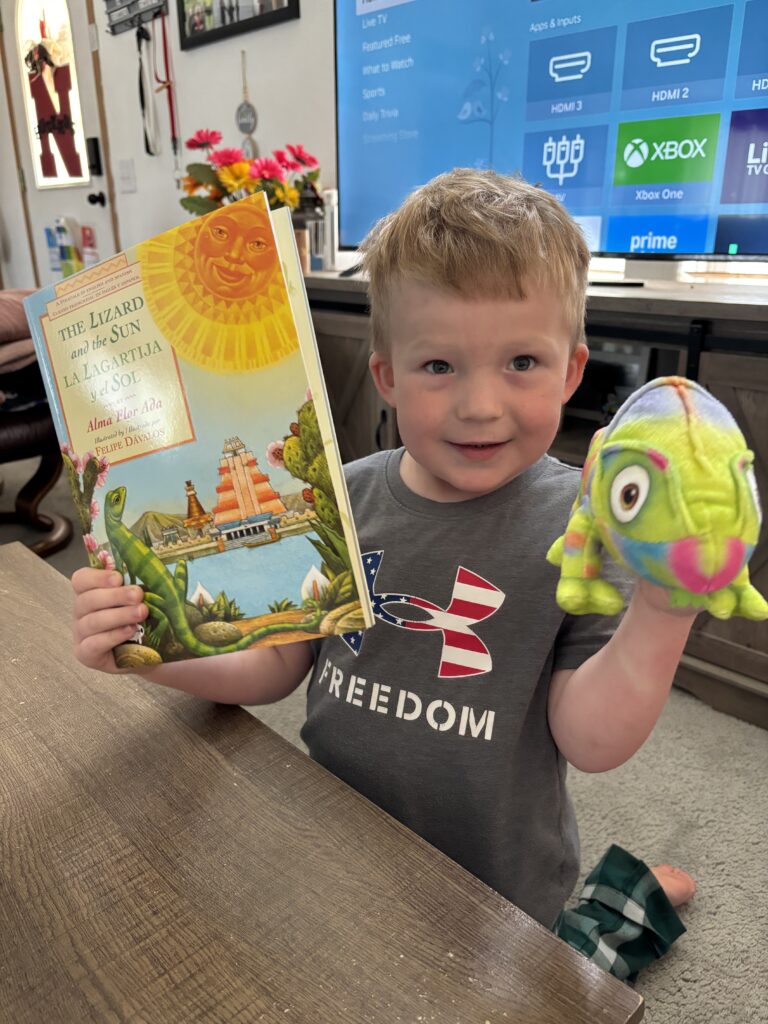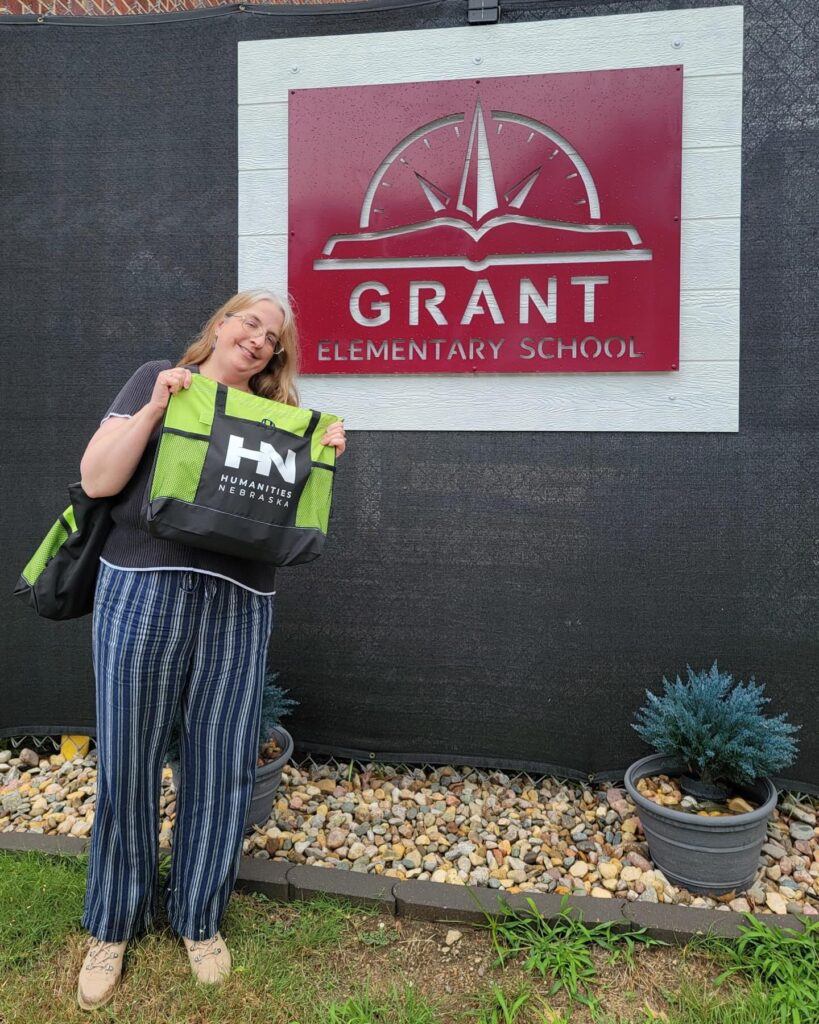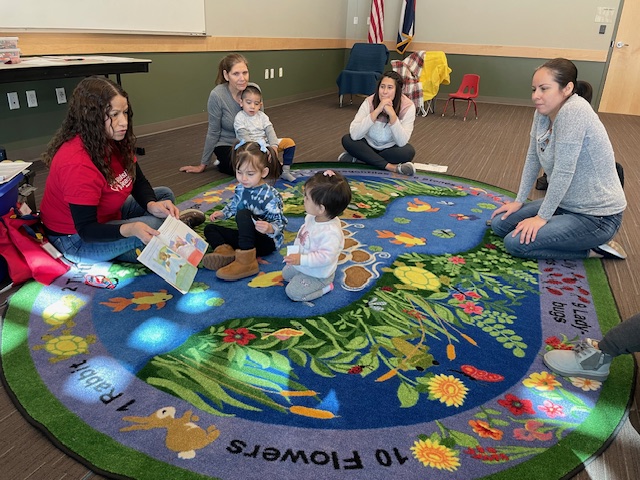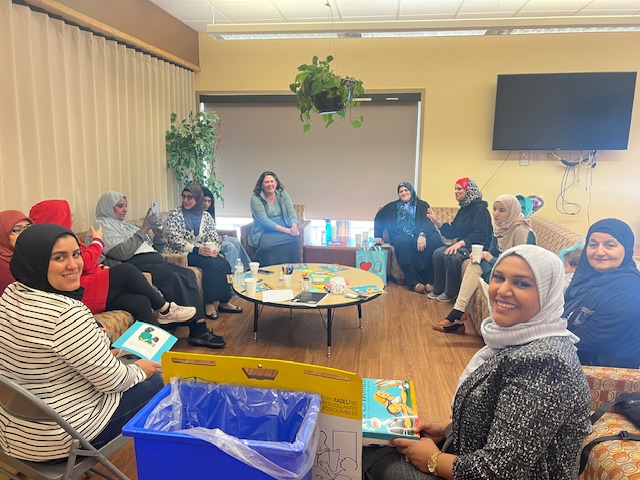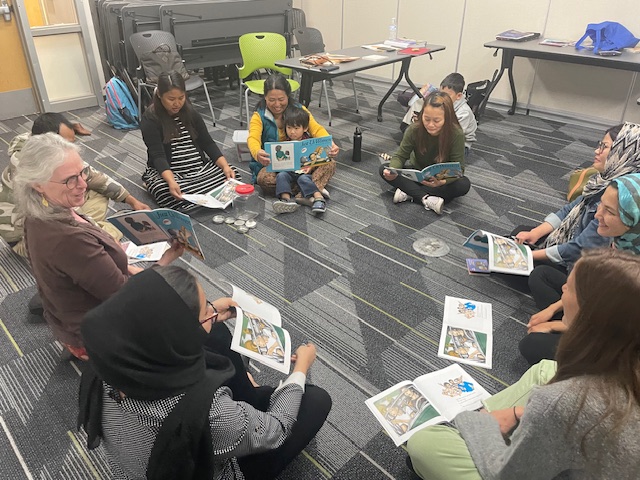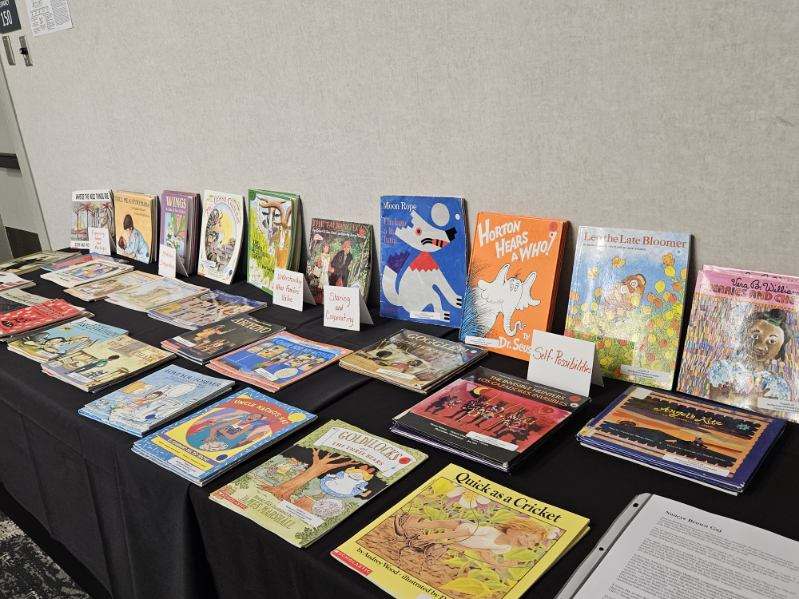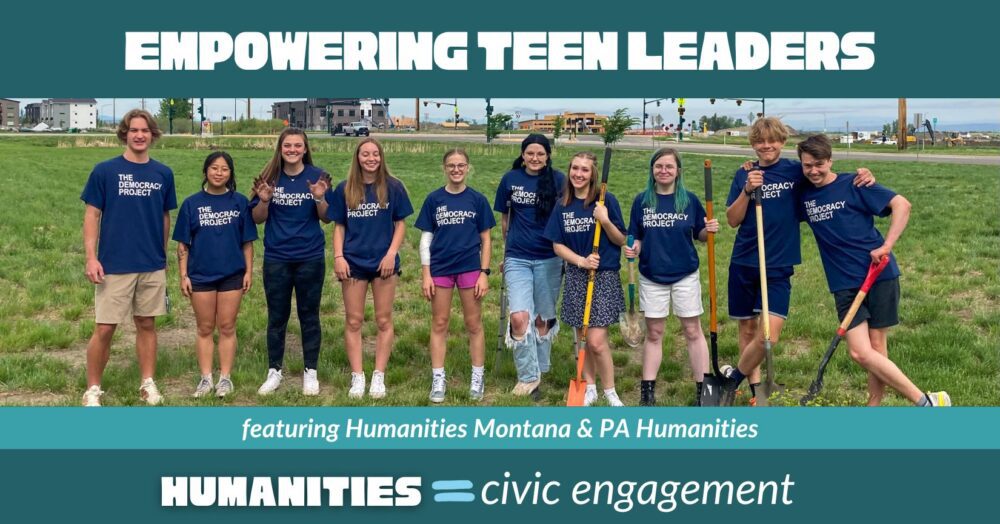Episode Description
Empowering and equipping families to read aloud at home is a powerful way to boost childhood literacy and help families bond. In this episode, we take a closer look at two family reading programs: Humanities Nebraska’s Prime Time Family Reading and Colorado Humanities’ Motheread/Fatheread. We’ll dig into how critical early reading is for academic achievement, the incredible benefits kids and families get from reading aloud at home, and how these two programs are giving parents the tools to make reading together a regular family activity. Get the transcript.
Listen
Humanities = is available on all major podcast platforms. Listen on your browser by using the player above or find your preferred platform here.
Guests
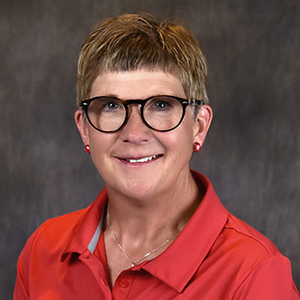
Lisa Guenther
Northeast Community College
Lisa Guenther is an Early Childhood Education Instructor at Northeast Community College. For 35 years, Lisa was an instructor for the Norfolk Public School System. After retiring from the public school system, she was Director of Reading at Norfolk Catholic Elementary and an adjunct instructor for NCC before assuming her current role.
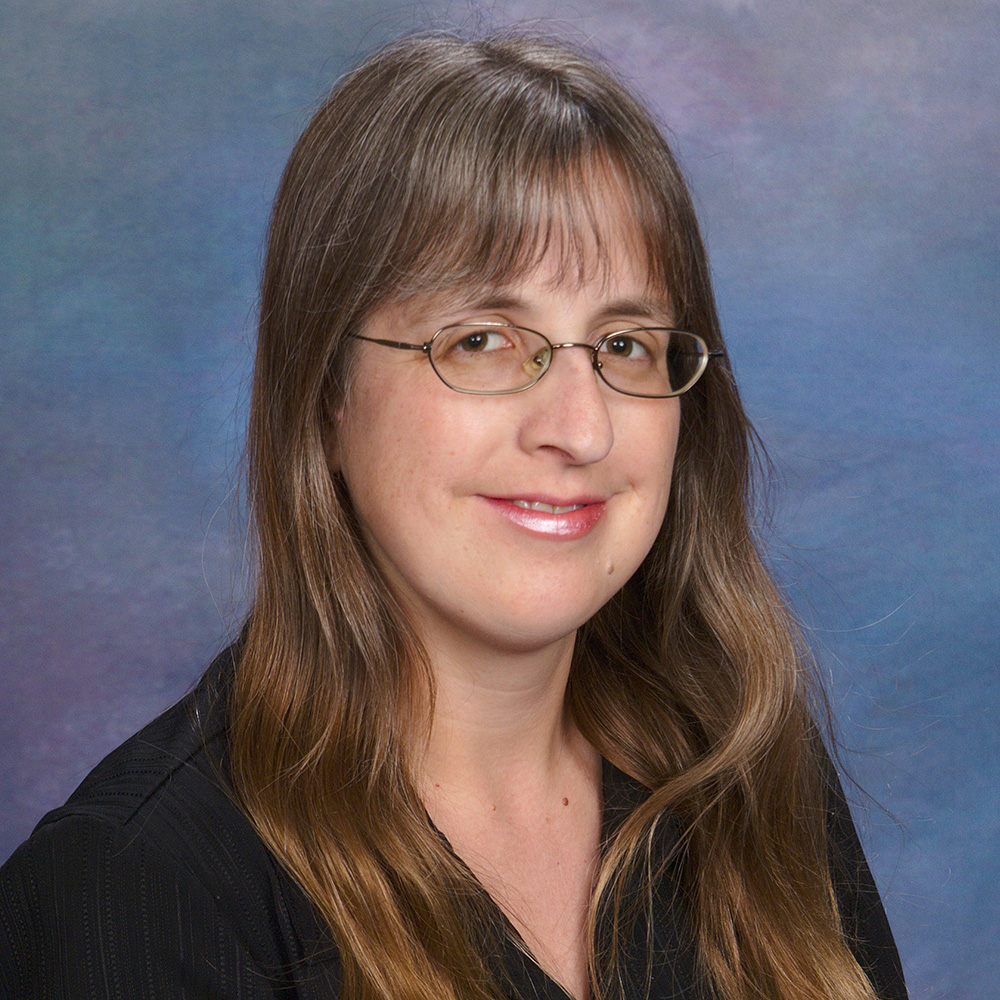
Erika Hamilton
Humanities Nebraska
Dr. Erika Hamilton, Director of Literary Programs, joined Humanities Nebraska in February 2005. In 2014, she earned her Ph.D. in English from the University of Nebraska-Lincoln. She has a master’s degree in English and creative writing from UNL and a bachelor’s degree in English and secondary education from Augustana College.
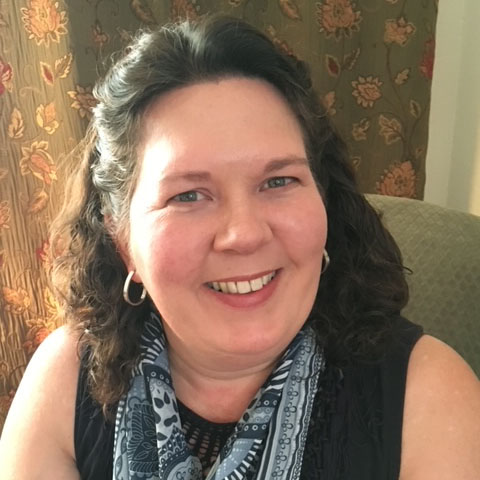
Karen Murphy
(Formerly) Colorado Humanities
Karen Murphy has been a Motheread/Fatheread and Story Exploring facilitator since 2007 and served as Colorado Humanities Motheread/Fatheread Program Coordinator 2021-2025. Karen is a licensed teacher and career literacy and parent educator for learners from infant to adult. She taught in Colorado public schools for 30 years.
Show Notes/Learn More: Humanities Nebraska and Prime Time Family Reading
The mission of Humanities Nebraska is to help people explore what connects us and makes us human. Humanities Nebraska was established as a state-based affiliate of the National Endowment for the Humanities in 1973.
About Prime Time Family Reading: Led by a storyteller and discussion leader, underserved children and their families meet in public libraries, elementary schools and other community venues to read and discuss award-winning children’s books. Discussion encourages critical and analytical thinking, helps develop connections between storybooks and real-life situations, and, in the bilingual program, encourages Spanish-speaking family members to speak and read English. Pre-school activities are offered separately for younger siblings.
Since 2002, more than 15,000 Nebraskans have participated in one or more of the 336 bilingual and English-only Prime Time series held throughout the state in 17 public libraries, 23 elementary schools, 9 community centers, one bookstore, and two Head Start centers in 18 communities statewide where student scores in reading do not meet Nebraska state standards.
Prime Time was developed in 1991 by the Louisiana Endowment for the Humanities and is offered in ten states, primarily through humanities councils.
Further Reading/Watching/Listening
Listen to the Prime Time “Little Voices, Big Ideas” podcast, aired by New Orleans Public Radio.
Read this report: “Stemming the Tide of Intergenerational Illiteracy: A 10-Year Impact Study of Prime Time Family Reading.”
Children and their parents in Highland, Nebraska, listen as Prime Time session leaders read a book out loud.
Humanities Nebraska’s Executive director Chris Sommerich packed his vehicle with 150+ Summer Reading Kits to hand deliver them in locations in western Nebraska in July 2025.
A child shows off the contents of their Prime Time Reading Kit, which include bilingual story books.
Erika delivers reading kits to Grant Elementary School.
Show Notes/Learn More: Colorado Humanities and Motheread/Fatheread
Colorado Humanities, a 501(c)(3) nonprofit, was established in 1974 as a result of the National Foundation on the Arts and the Humanities Act signed into law by President Lyndon B. Johnson in 1965, and the subsequent founding of the National Endowment of the Humanities (NEH). They have forged hundreds of community partnerships and have created more than 90 unique initiatives in their 50-year history. Colorado Humanities provide programs at no cost to participants and reach an estimated 340,000 people each year as program partners, participants, and audiences.
Motheread/Fatheread Colorado is no longer an active program due to cuts to humanities councils’ federal funding in April 2025. Until this year, the long-running program trained facilitators to work with groups of parents of infants through early elementary school in a series of sessions proven to raise children’s Language Scores and help them to discover the vital link between literature and life. Children whose parents participated the program showed higher rates of growth on Teaching Strategies Gold Language Domain.
The curriculum used children’s books and adult poems and narratives to teach literacy-promoting skills to adults. Each lesson in the 29-lesson curriculum included a variety of ways to develop parents and children’s literacy skills. Participating parents, no matter what their reading level, read aloud more actively and frequently, promoting home reading behaviors that improve children’s school success. The children’s literature that parents learn to share was chosen for its expression of social-emotional themes, cultural diversity, and beautiful illustrations. Parents report that children exhibit more interest in rhyme, interaction with books and awareness of words in their environment.
A bilingual Spanish and English parent group attends a Motheread/Fatheread session.
A bilingual Arabic and English parent group attends a Motheread/Fatheread session.
Dari- and Burmese-speaking parents at attend a Motheread/Fatheread session.
Children’s books displayed at a Motheread/Fatheread facilitator training.
What are Humanities Councils?
Our nation’s 56 state and jurisdictional humanities councils are nonpartisan 501(c)3 nonprofit organizations established in 1971 by Congress to make outstanding public humanities programming accessible to everyday Americans. Councils are funded in part by the National Endowment for the Humanities (NEH) and connected by their national membership association, the Federation of State Humanities Councils.
Episode Transcript
Read Episode Transcript
[Theme music plays]
Lisa Guenther: Reading aloud, simply reading aloud to a child has been shown to be the number one way to grow comprehension, critical thinking, and reading skills. I believe we can change the nation by reading aloud to children, and Prime Time is a part of that solution.
Karen Murphy: If you don’t have that foundation and you don’t have the buy-in from the families and you don’t have everybody working in the same direction, a lot of opportunities are lost for these kids. And if we want to keep impacting the reading and learning and everything of kids, I think this is where people should be investing.
Hannah Hethmon (Narration): You’re listening to Humanities =, a podcast about real individuals, organizations, and communities making a real difference through the humanities.
I’m your host Hannah Hethmon.
Humanities = is a production of the Federation of State Humanities Councils.
In this episode, we’re taking a closer look at how humanities councils are boosting childhood literacy and vocabulary by empowering and equipping families to read aloud at home. Taking a deep dive into two family reading programs—one in Nebraska and one in Colorado—we’ll dig into how critical early reading is for academic achievement, the incredible benefits kids and families get from reading aloud at home, and how these two programs are giving parents the tools to make reading together a regular family activity.
We’ll start in Nebraska, where Humanities Nebraska runs Prime Time Family Reading. Prime Time was developed in 1991 by another humanities council, the Louisiana Endowment for the Humanities and has now expanded, through an affiliate model, to eight other humanities councils.
To learn more about Prime Time and how it’s helping families in Nebraska I spoke to Erika Hamilton, Director of Literary Programs for Humanities Nebraska, and Lisa Guenther, Early Childhood Instructor at Northeast Community College in Norfolk, Nebraska. Lisa has been involved in Prime Time for many years coordinating sessions in Norfolk and her early education students at the community college provide support for the program there as part of their training.
Hannah Hethmon:
So, Erika, what is Prime Time reading? Who is it for? How does it work? Tell me about this program.
Erika Hamilton:
Prime Time Family Reading is a six-week family literacy program. We model to families how to read books together out loud and then we also show them how to discuss the books.
Prime Time family reading is all about discussion and making connections with those books we are reading. So, we’re asking questions. We’re also helping to develop their critical thinking skills. We make personal connections to the stories and to each other.
And we do this—we have three different formats. Prime Time started with elementary school children, that’s Prime Time family reading for ages 5-10 or 6-10. We also have Prime Time preschool for ages three to five. And then in 2020, we developed summer reading kits so that families could continue discussing at home.
Hannah:
So, Lisa, as someone who’s been in these programs and seen them firsthand quite a bit, what’s a typical Prime Time reading event like? Bring us along to a session.
Lisa Guenther:
Families are invited and we start out with a meal so the parents don’t have to worry about cooking. They come and the first half hour is the meal, and we also try and talk during the meal, you know, and visit. So that’s the first half hour. Then, when it’s time for the Prime Time session to begin, my early childhood education students take the preschool children, and they have planned reading lessons and centers for them. So, we take care of the preschool children so the school-aged children have their parents to themselves and they can enjoy the storytelling.
So, this Prime Time reading session starts with the introduction of a quality children’s literature book. It is in more languages than English, so we include all of our bilingual families. Prime Time is for everyone.
So, we have the book introduction, reading of the book involving the families, and then the all-important discussion, and some type of craft or activity at the end. The discussion is very important. It ensures comprehension, it grows critical thinking, and it grows their vocabulary. Then at the end of the session, Prime Time sends home books for the families to read at home.
And the goal is that they saw that good reading model of reading the book, talking about it, discussing when it’s done, and then they have books that they take home to read and then they return those books at the next session to get a couple more. Wonderful program.
Hannah:
And so, what kind of questions? What’s a good question for parents to ask?
Erika:
One example is, and we use this in training all the time, is having families talk to each other about it. So, if we’re reading a book about dreams, we can ask the parents to tell their children what their dream was when they were a kid, what they wanted to do when they grew up. And then we ask the children to tell their parents, what do you want to do when you grow up. And they have this conversation where they’re exchanging ideas and dreams. And then they get to come back into the full group and the parents will or the guardians or the adults will share with the full group what their child said about their dream, what they want to be when they grow up. And then the kids get to share what their parents’ dreams were. And so, it’s this fun conversation. It really helps when you have shy people because the parents are going to be so excited to share what their child said and their child is going to be, they’re going to think it’s a lot of fun to share what their parents said.
Hannah:
That’s so cute. So, a question for both of you. You know, of all the areas of need, know, Humanities Nebraska addresses a lot of different types of needs through the humanities in the state, but of all those needs, why is family reading a priority and, you know, why did you really feel this program needed to be in Nebraska?
Lisa:
90 % of a child’s brain develops between birth and age five. So, this time is so important. Children who have been read to every day from birth to age five have 30 million words in their vocabulary. 30 million words. When I started teaching first grade, I thought a good teacher and a good reading series could make up that 30-million-word difference in first grade. You cannot make up a 30-million-word vocabulary difference. And then once they start school, you learn to read kindergarten to third grade. That’s when you learn to read. At third grade, you use those reading skills to read to learn. Kindergarten through third grade is vocabulary, comprehension, critical thinking. Those skills are needed and reading aloud, simply reading aloud to a child has been shown to be the number one way to grow comprehension, critical thinking, and reading skills. It’s vital. I believe we can change the nation by reading aloud to children, and Prime Time is a part of that solution.
Erika:
Louisiana has done studies on the effect of Prime Time on the students. And across the board, students who have participated in Prime Time will increase their standardized testing scores. And that’s not just in English and reading comprehension, that’s across the board in every subject area because we are teaching critical thinking skills. And that is so important for graduating from high school, going to college, or even if you’re not going to college, going to a trade school, or opening your own business, or joining the family business. It’s still important to have those reading skills, and those comprehension skills, and the critical thinking skills. And reading is such a huge part of the humanities. The humanities are all about learning and reading and comprehending and understanding and questioning. And Prime Time questioning is a big part of that.
Hannah:
So, Prime Time has been running in Nebraska for almost 25 years, but it wasn’t until 2020 that you added the summer reading kits that families can check out and use at home. I’m guessing that was inspired by the pandemic, but can you tell me more about these kits and how families have been using them?
Erika:
You’re right, it had to do with the pandemic. We had 25 spring programs on the schedule and then everything got canceled. We thought, what if we design these kits that use a Prime Time methodology and we can distribute them to families throughout the state so that when they’re home together, they’re reading together. We didn’t want the children to lose their reading skills during this very tough time.
Now we’re kind of out of that pandemic area, but there’s still this demand for summer reading kits. Summer slide was a thing long before the pandemic where you had two to three months out of school, children weren’t reading, they were falling behind. These summer reading kits help complement what libraries do with summer reading. We partner with public libraries, we partner with public schools, organizations, community learning centers, preschools…to continue distributing these kits during the summer. And this year especially shows the high demand for this. We put out applications. We made 500 summer reading kits. 82 organizations and 31 Nebraska communities applied requesting over 1,400 kits.
Hannah:
Wow.
Erika:
We only had 500, so we had to make some tough decisions, but there is a high demand for this sort of program.
Hannah:
So, what’s in the kits. People check them out from the libraries or preschool centers and what’s inside?
Erika:
These aren’t kits that they check out and return. They get to keep them for free. We have six books and we have a discussion guide that is, once again, based on Prime Time methodology. We have craft supplies.
Hannah:
Oh wow.
Erika:
Yeah, so we partner with organizations to distribute these kits all over the state. The families get to keep it. It’s in a tote bag. They get to keep it for free and they never have to return it. And they get so excited to have six books for their family library that they don’t have to return it.
Hannah:
Wow, so I’m sure over the years there have been some really lovely, heartwarming, and cute moments in this program. So, can you all share some of your favorite memories, your favorite moments, families that have stuck in your mind?
Erika:
One thing that sticks out to me is, you know, we’ve been doing this for almost 25 years. And so, we have stories in Nebraska of Prime Time children or Prime Time parents who become Prime Time team members later on in life. So, we have a program coordinator in Lexington. I love telling her story because she started as a mom who brought her little son to Prime Time. They were just new to the community. They came to Prime Time in Lexington Public Library in Nebraska and she loved the program. She loved the program so much and it helps her son too, but this story is about her because it prompted her to think about starting a new career as a public librarian. She is currently a children’s librarian at the library, and she is the program coordinator of Prime Time. She gets teary-eyed when she talks about Prime Time, because it’s so important to her. It was so important to her own family, but she wants to bring the benefits that she saw with her son to other families in the community.
Lisa:
My daughter Molly is one of those people. Also, she grew up helping me with Prime Time, moved to Lincoln, and then she got involved volunteering with Prime Time in Lincoln. So it does change people’s lives in a very positive way.
Hannah:
Fantastic. Thank you both so much for taking the time and sharing your passion about this project or this program.
Hannah:
Our next story explores a similar family reading program administered by Colorado Humanities called Motheread/Fatheread, which was developed by a North Carolina nonprofit called Partners for Children and Families. Colorado Humanities used this curriculum to train facilitators and support them in organizing and leading classes for parents of children aged infant to elementary school. These classes taught parents how to promote their children’s literacy while improving their own listening, speaking, reading, and writing skills.
And I’m using the past tense here because sadly this amazing program was canceled earlier this year when the Department of Government Efficiency terminated all humanities councils’ operating grants overnight. Since then every council has since had to make difficult decisions in order to continue serving their communities. But I think that’s even more reason to highlight the impact of programs like Motheread/Fatheread Colorado, and in fact, despite being canceled, the program’s impact lives on through the large network of facilitators they’ve trained over the years.
To learn more about Motheread/Fatheread, I spoke to Karen Murphy, who was the program’s coordinator at Colorado Humanities. Karen has such a passion for this program that even though the program’s been canceled and she’s no longer with the council, she took time out of her day to talk to me and share why thinks it’s so important.
Hannah:
Can you describe what an experience might be like ?the person, the adult who brings their kid to this reading program?
Karen:
Okay, so for the families that sign up, we usually try to first remove all the barriers to participation so they can be there. So that might be providing dinner. It always means providing the materials they need and the books. And then often childcare also, because the parents and children are separate usually, so that the parents can have an adult discussion about a children’s book. And it’s fascinating because adults often say, I never realized how much I could get out of a children’s book, they said “I see it completely differently now.” So, we are letting the adults have the literacy experience at the adult level and then showing them how to make that approachable for their children and how they are to engage at a child-friendly level.
And then the parents and children can get back together in the session or at home, and the parents get to practice the skills in the class, and then they do it at home with their children. We really make them like the experts, and we give them that confidence that they are now able to support their children’s literacy development and to guide some of this learning at home. And we have heard from almost every parent that this is not what was happening before, and now the adults love it as much as the kids love it.
Our Colorado model has been at least six sessions. This was designed for a women’s prison. The women there were taking classes. And one of the classes was this kind of reading centered around children’s books. And this allowed them to have something they could share with their children at home, as well as improve their own reading skills at a very comfortable level because children’s literature is just much lower threat. But the books are chosen specifically for their high quality, their beautiful illustrations. They’re often like Caldecott award winners. And they’re centered around early childhood themes. And it helps the parents to understand their children better and to know how to support them better and to use books in part of that process.
Hannah:
So, Colorado humanities did not create this curriculum. You’ve kind of taken it and adapted it. So, first where did who wrote where did this curriculum come from and why did Colorado humanities want to use it and see that it could be useful for their community.
Karen:
Colorado Humanities chose this program that was developed in 1987 in North Carolina, again, for this women’s prison system. They’re still using it like that today, and they’ve also engaged in men’s prisons as well. In Colorado here, we’re now using it in detention centers here, so we’re serving some similar populations in many ways. But in the early 2000s, when Colorado was having a real struggle with low student achievement in the public schools. This was a growing concern for Colorado citizens and so in September 2005 they reported that even after nine years of all this testing and things and focus on reading there was really almost no change in reading and writing. So, the report was also citing that there’s a huge achievement gap that was growing between the Hispanic and Latino students and the white students.
Hannah:
And so, this is kind of coming in to address that gap by bringing that literacy home before they even get to school or in addition to school.
Karen:
Yes, because actually the first five years are more important sometimes. Whatever the child’s base is when they start school in kindergarten tends to be a great predictor of that third-grade level, which we know is the great divide between those who are going to become readers and those who are not. And those who are not strong readers by third grade, sadly, almost never catch up.
The program as it is written is phenomenal. The main thing I think that makes it so special is it’s not just about reading a book. We teach them how to make the book come alive as they’re reading and there are questions much deeper questions than you would imagine that people would normally ask a child. They have to move away from the, know, “Do you see a blue truck” kind of question into things like, “How do you think this character was feeling?” Or “What else could he have done in this situation?” Or “What does our family do to work together the way, for example, the way three Billy Goats Gruff work to beat the troll,” that kind of thing. And they go so much deeper and that’s where the great family conversations occur. And it allows them to share their own beliefs and their own philosophies and unite as a family.
Hannah:
Once you’ve trained your facilitators, where are they putting on this program? Who’s hosting them around the state? What types of communities are hosting them?
Karen:
The different programs that are running today that I’m aware of are in school districts, in detention centers for men and women, immigrant and refugee services groups, early childhood centers and councils, home visiting programs, community play groups, libraries, preschools, places like that.
Hannah: So, let’s talk about stories. Can you share stories, moments, anecdotes, examples from the Motheread/Fatheread history?
Karen:
I would first mention a group who serves immigrants and refugees from various countries, particularly a group that stands out are the Afghans that I’ve worked with. Some of those people who are from Afghanistan, but were highly bilingual in English and Dari, they came to the training and then they took this back to the families that they work with.
Hannah (Narration): I want to jump in here to explain how the dual language component works in this program. For languages like Dari, where there are not many children’s books available in the US, those bilingual program facilitators translate the English books, then paste the translated text in Dari into the books. The parents are then taught to read the story in both their native language and in English. This empowers the parents to increase literacy and vocabulary in both languages for themselves and their kids.
Karen:
So, they present to their families bilingually so that they’re supporting if any of them are developing their English as well as supporting their home language and culture.
And I could see firsthand when I’d visit these sessions, the awesome conversation and the participation of these parents. And they came week after week just wanting more. They would thank me for bringing this to their leaders to bring it to them. But really the magic happens with their own leaders because they understand the culture, they understand the language, they understand the actual kind of needs or thought processes in their community.
These families said that they’re reading now or reading differently than they had before the sessions and that things are changing. Their children are running to them with books when they had never picked up a book before and they are begging them to read and they’ve now centered like specific family time around this opportunity to read together and they’re loving it. The fathers are feeling extremely proud that they can do this and the mothers are feeling like this is a beautiful opportunity. They’re now passing on their language, their culture, and it brings them tighter as a family because as they come to the United States, it can be really traumatic as you leave your home culture, your country, your language. And when your children enter school, this I’ve heard this from families from many different cultures, the kids are immersed in English and they come home and they try to bring that English back home, especially when they have the older and younger children. And now the parents are kind of left out and there becomes a divide. But this keeps the families united, keeps their language alive, and keeps them connected to their history as well as what they’re learning and living in the US.
Hannah:
And as part of the program did Colorado Humanities provide funding for people putting on the program? How did that work?
Karen:
Oh yeah, the funding that we were able to provide was amazing. First of all their training was free, even though it cost approximately $1,000 to train each person because it was a three-day event, and we put them up in a hotel and they would attend the three days of training, get a huge notebook. Then when they went back, we would also coach them and support them as they were trying to plan how this was going to work. Whatever it was, whether it was how to approach your school district, how to get people to sign up, that kind of thing, how to recruit attendees. And then we also could offer things like stipends for the meals that were being provided. We would cover the cost of the books, often sets of materials for the parents to use in the class and to take home because if you do not send the parents home with the crayons and paper and glue sticks or whatever is needed, they’re not gonna be able to make the puppets sometimes or actually do the activities. We also supported sometimes the costs of the child care that was needed, and the facilitators themselves would receive a stipend if they weren’t being paid by their own school district or something.
Hannah:
Wow, so yeah, really start to finish supporting every little detail that’s needed to make this happen. Like you said, removing those barriers.
Karen:
And that would ensure that it would happen again and again because it became such an integral part of what they were doing that they would continue to run it. Sometimes they’d ask for help again, but pretty soon their organization would often just plan around it and be able to take it on.
Hannah:
So now we have to go to the sad part. As I’ve mentioned at the beginning of this episode, Colorado had to stop these trainings because federal funding was cut. So, can you talk a bit about what’s lost without these trainings being provided by Colorado Humanities? And what do you feel is that impact?
Karen:
Well, I definitely saw the impact immediately and I just kept reporting this back to Colorado Humanities and saying this we have a huge hole here because I would get one to two requests weekly for more people who wanted to take the Child Care Read or the Motheread/Fatheread training. I’ve searched around and done a lot of research and there’s really nothing that takes the place. They want to impact the same kinds of things that we were impacting, but almost everything is offered now online. It’s virtual. It might even be prerecorded. And there’s a huge difference between that and face-to-face training and face-to-face interaction.
We know that birth to five, those experiences are as or more important than everything that happens thereafter. If you don’t have that foundation, and you don’t have the buy-in from the families and you don’t have everybody working in the same direction, a lot of opportunities are lost for these kids. And if we want to keep impacting the reading and learning and everything of kids, I think this is where people should be investing.
Hannah (Narration):
There is a silver lining to this story. Over the program’s many years, Colorado Humanities trained more than 1000 facilitators to lead Motheread/Fatheread programs. Many of these facilitators are continuing to lead programs in their own communities, which means more parents are learning to promote literacy at home, which means more children succeeding in school and in life.
Thanks for listening to Humanities =, a podcast from the Federation of State Humanities Councils. You can learn more about the humanities councils and programs in this podcast, see episode transcripts, and explore additional content on our website, statehumanities.org, that’s statehumanities.org.
Our nation’s 56 state and jurisdictional humanities councils are nonpartisan nonprofit organizations established in 1971 by Congress to make outstanding public humanities programming accessible to everyday Americans.
If you’d like to learn more about your humanities council or support their work through a donation, you can do so at statehumanities.org/directory or by searching your state name + “humanities council.”
